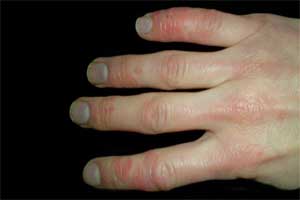- Home
- Editorial
- News
- Practice Guidelines
- Anesthesiology Guidelines
- Cancer Guidelines
- Cardiac Sciences Guidelines
- Critical Care Guidelines
- Dentistry Guidelines
- Dermatology Guidelines
- Diabetes and Endo Guidelines
- Diagnostics Guidelines
- ENT Guidelines
- Featured Practice Guidelines
- Gastroenterology Guidelines
- Geriatrics Guidelines
- Medicine Guidelines
- Nephrology Guidelines
- Neurosciences Guidelines
- Obs and Gynae Guidelines
- Ophthalmology Guidelines
- Orthopaedics Guidelines
- Paediatrics Guidelines
- Psychiatry Guidelines
- Pulmonology Guidelines
- Radiology Guidelines
- Surgery Guidelines
- Urology Guidelines
Estrogen suprisingly abundant in men with scleroderma, tied to low survival

Estradiol -- a type of female hormone estrogen -- is surprisingly found more abundantly in older men with scleroderma than postmenopausal women with the disease, suggests evidence from a recent study published in the journal Arthritis Research & Therapy.
The Medical University of South Carolina (MUSC) study, published in the journal Arthritis Research & Therapy, also found that men with scleroderma having higher levels of estradiol had more heart involvement and more severe disease. Those with the Scl-70 autoantibody and higher levels of estradiol had a greater risk of death.
Scleroderma, also called systemic sclerosis, is a female-predominant disease characterized by excessive formation of connective tissue causing skin and internal organs thickening, ultimately leading to organ damage. Men have more severe disease but women are three times more likely, and women in their child-bearing years nine times more likely to have the disease than men.
Scleroderma develops in women during their child-bearing years, when estrogen levels are at their highest. This has led researchers to speculate that estrogen may play a role in the disease, as well as other autoimmune diseases.
Further fueling that speculation were findings from hormone replacement therapy trials that women's skin thickened during therapy and then returned to normal after completion of treatment.
Carol Feghali-Bostwick, the SmartState and Kitty Trask Holt Endowed Chair for Scleroderma Research at MUSC and senior author of the article, has previously reported that similar thickening occurred in skin cultures exposed to estradiol.
The MUSC team's recent findings provide some of the first evidence to confirm a link between high estrogen levels and the development of scleroderma. They also begin to explain why men, in whom the disease is less frequent, often have more severe symptoms.
"It seems reasonable to say that estradiol is probably one of the reasons why men have more severe disease," said Feghali-Bostwick.
Feghali-Bostwick had previously shown that postmenopausal women with scleroderma have elevated estradiol levels. To see if these levels were also high in men of the same age, she and Baker Frost turned to serum samples banked at the University of Pittsburgh Scleroderma Center. Feghali-Bostwick co-directed that centre before joining MUSC.
The team tested estradiol and scleroderma autoantibody levels in banked samples from 83 men aged 50 years and older with diffuse cutaneous systemic sclerosis, a type of scleroderma. They also tested samples from 37 healthy men of a similar age. They then used a variety of statistical approaches and the careful clinical annotations accompanying each sample to determine whether estradiol levels were linked to any of the clinical traits of scleroderma.
Key Findings:
- Male patients with diffuse cutaneous scleroderma had significantly higher levels of estradiol (average, 30.6 pg/mL) than both healthy men (average, 12.9 pg/mL) and postmenopausal women with the disease (24.2 pg/mL).
- Those with higher estradiol levels (average, 43.7 pg/mL) had significantly more heart involvement than those with lower levels (29.4 pg/mL).
- For patients with the Scl-70 autoantibody, increasing levels of estradiol in the serum was associated with a significantly greater risk of death.
But how is it possible for men to have such high levels of a hormone associated with the female reproductive system?
"Men can convert their testosterone to estrogen via an enzyme called aromatase," explained Feghali-Bostwick.
Aromatase can convert other tissues such as fat into estrogen in women as well. Preventing that conversion could be a novel therapeutic approach to scleroderma.
Aromatase inhibitors are already being used to treat women, particularly postmenopausal women, with hormone-receptor-positive breast cancer. The MUSC team would like to conduct a small trial to assess the efficacy of aromatase inhibitors in patients with scleroderma.
Even if the costs of a trial in patients with scleroderma prove to be too high, Feghali-Bostwick believes there is much to learn from existing data from large breast cancer trials of aromatase inhibitors. For example, she would be very curious about how the aromatase inhibitors affected patients who had both breast cancer and scleroderma.
"What happened to their scleroderma when they were treated with aromatase inhibitors?" asked Feghali-Bostwick.
"Knowing that would help inform us about the utility of aromatase inhibitors. It's hard to access large breast cancer study data. However, doing so would provide us with key information in assessing whether aromatase inhibitors have a role in scleroderma."
For more details click on the link: http://dx.

Disclaimer: This site is primarily intended for healthcare professionals. Any content/information on this website does not replace the advice of medical and/or health professionals and should not be construed as medical/diagnostic advice/endorsement or prescription. Use of this site is subject to our terms of use, privacy policy, advertisement policy. © 2020 Minerva Medical Treatment Pvt Ltd